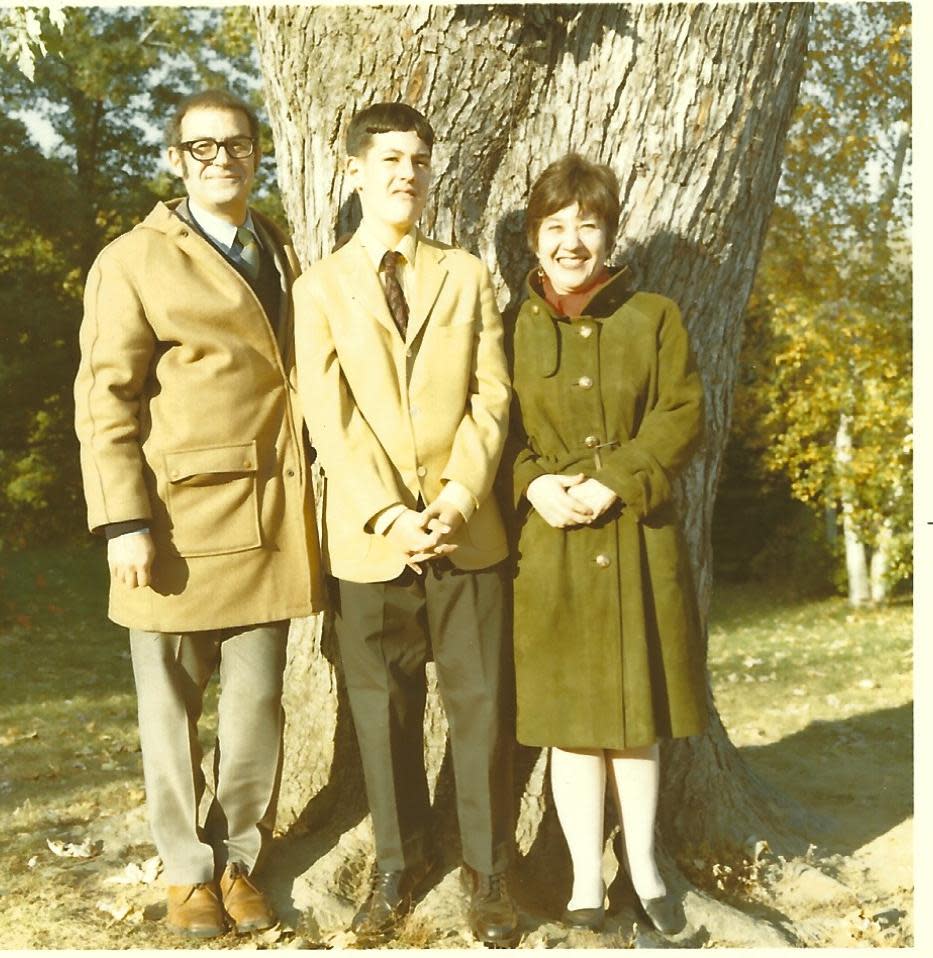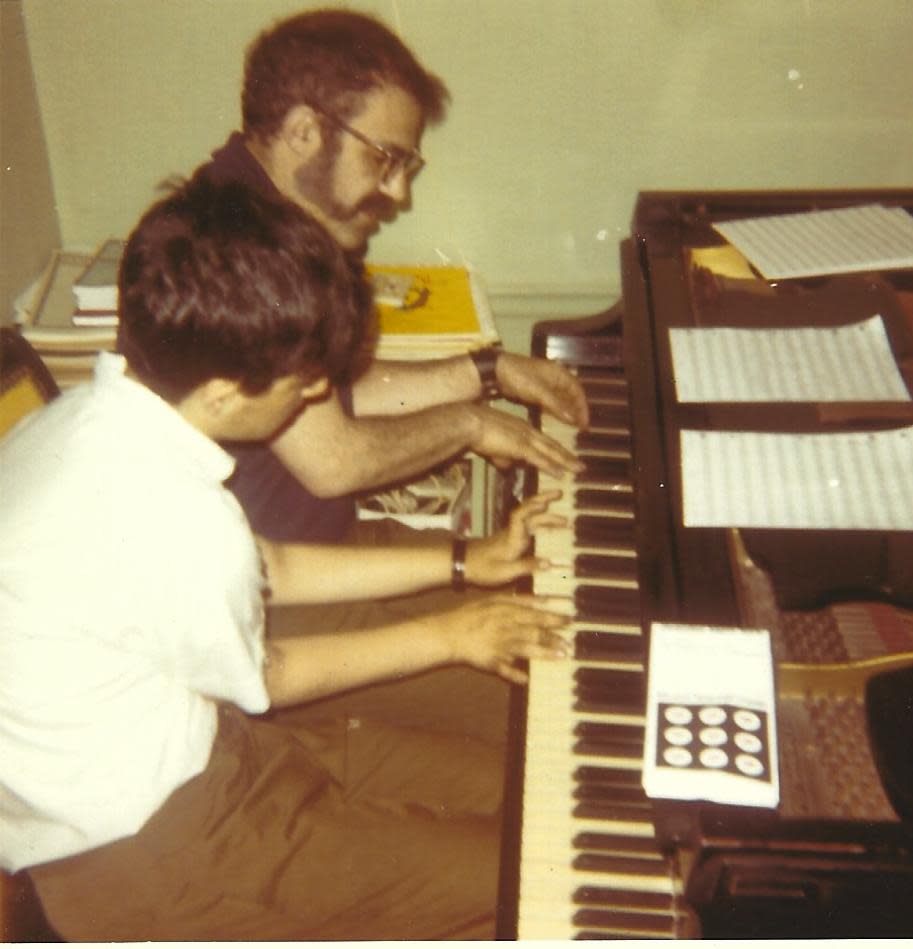My Jewish family celebrated Christmas in a psychiatric hospital. It was a gift for us all.
My mother was raised by Jewish immigrants who held firmly to their ancient traditions. Celebrating a Christian holiday was unthinkable. My father came from a non-religious German Jewish family and was willing to go full Hebrew on my brother and me. But when my brother, Andy, was three, the nearby Jewish nursery school banned him.
Doctors would soon diagnose him with autism and severe “mental retardation.” When my parents did find a school that would welcome Andy it was run by a minister in the basement of a downtown church. The first time my brother saw Christmas lights on the school's tree, he was entranced in a way no one had ever seen before. Thus did a Christmas tree breach our front door and betray a few thousand years of Jewish resistance.
I’m not sure my mother was ever entirely free of the guilt of opening presents around a trimmed evergreen while her sisters and their families quietly endured Dec. 25 with Chinese food and old movies; but the more successful — and famous — my mother became the less anyone — family or otherwise — seemed to judge her. Ultimately, Charlotte Rae (Lubotsky) felt no less Jewish than the day she was born, just a little more expansive in her idea of spirituality.
Singalongs for the season
Both my parents, Charlotte and John, were spiritual seekers. It might have been their nature but I think for all three of us there was something metaphysical in our connections to Andy — those vanishing moments when we found a way to get him out of his autistic trance.
Lifelong longing: This Advent season, I know God accepts me as a gay Catholic. But do other Christians?
We never stopped hoping he would get better. My parents took care of him in our apartment for 12 years. Then they paid for a special boarding school in Pennsylvania until adolescence turned Andy into a menace, when they found him the best institutional setting, first in New York and then, when we moved west, Camarillo State Hospital, a sprawling psychiatric and drug and alcohol detox facility not far from Los Angeles.
When I used to visit my brother on Unit 88, the facility’s “developmental center” I’d imagine the ghost of Charlie Parker (who spent some time detoxing there) tossing his spontaneous melodic masterpieces down the long gray hallways.
My brother lived on Unit 88 most of his adult life and every Christmas our divorced parents led the singalong there, my father parked behind the battered upright and my mother holding a microphone plugged into a guitar amp.

They harmonized on “Santa Claus is Coming to Town” and “Rudolph the Red Nose Reindeer.” She’d get the residents to clap or sing with her, then encourage everyone to take the microphone and lead a song. Mostly it was an anthem to their disabilities, mental and physical. Their moaning and croaking — over my father’s steady cords — was terribly sad, but also joyous for their unselfconscious enthusiasm.
An old man named Ray always asked for the key of C before he belted out an atonal “White Christmas.” Two women whose names I cannot remember would shriek “Silent Night.” An energetic young man in a helmet would get up to sing “We Wish You a Merry Christmas” and shove the microphone so far into his mouth someone had to intervene.
Hanukkah makes a comeback
I don’t think I really appreciated how much this Christmas singalong meant to everyone. For the other parents, having a famous person among them might have given greater meaning to their struggle, and I believe my mother was deeply inspired by the mothers and fathers who showed up to the Christmas party year after year. She always cried a little by the time she soldiered through a “Jingle Bells” duet with Andy.
The program hardly ever changed — until one year a new resident named Jerry sat sullenly alone next to the payphone and when my mother invited him to get up to sing, he told her to shut up and ranted incoherently. My mother watched Jerry for a moment with a far-away expression on her face. A staff member marched toward Jerry to admonish him, but my mother launched into an impromptu rendition of “I Have a Little Dreidel” while my father comped along.
Redeeming man, crushing evil: The real Christmas story is a subversive tale about a new start for a corrupt world
Jerry shot out of the chair. He dodged the approaching staff member, grabbed the microphone out of my mother’s hand and, in his gravelly voice, belted out the words to the Hanukkah standard. Jerry seemed to know the song by heart. He kept grinning and looking at that old piano and my old parents with disbelief and wonder.
He was still holding the microphone when another staff member burst through the door in a Santa suit hollering, “Ho ho ho!” and hauling a heavy red bag of goodies.
Jerry shouted into the mic to get the staffer's attention, but he confused the Santa with a rabbi, and insisted that the rabbi was here with a present for him.

I looked over at my parents, thinking at least one of them might have gotten a laugh out of Jerry’s theological confusion. But they were focused on Andy, making sure he was ready to receive Santa’s present. My mom seemed relieved to finally be off her feet and letting someone else carry the show.
Courage at Camarillo
Camarillo closed in 1997, scattering everyone in Unit 88 to other facilities throughout the state. I don’t know what became of anyone else but my brother passed away before the end of that year, a few weeks shy of his 44th birthday.
Social status, class struggles, identity: From Rudolph to Charlie Brown, your favorite Christmas cartoons hold political messages
The facility was turned into California State University Channel Islands, which some of my former students have since attended. A few years ago, my wife and I drove one student up there because she had no family to drop her off and get her situated. I’d always figured Unit 88 had been converted to a dorm but it seemed like they had torn down just about all of the old buildings.
Still, just being there made me imagine the ghostly echoes of Charlie Parker’s saxophone along with my father's Christmas — and Hanukkah — stylings and my mother’s beautiful voice. Amid all the croaking and moaning, the agonized and agonizing attempts at melody from the residents who used to fill that place, there was courage and determination.
I hope that somehow manages to reach all the students who now go to school there.
Larry Strauss, a high school English teacher in South Los Angeles since 1992, is a member of USA TODAY's Board of Contributors and the author of more than a dozen books, most recently "Students First and Other Lies" and, on audio, "Now's the Time" (narrated by Kim Fields). Follow him on Twitter: @LarryStrauss
You can read diverse opinions from our Board of Contributors and other writers on the Opinion front page, on Twitter @usatodayopinion and in our daily Opinion newsletter. To respond to a column, submit a comment to letters@usatoday.com.
This article originally appeared on USA TODAY: My Jewish family's Christmas singalongs uplifted my disabled brother

